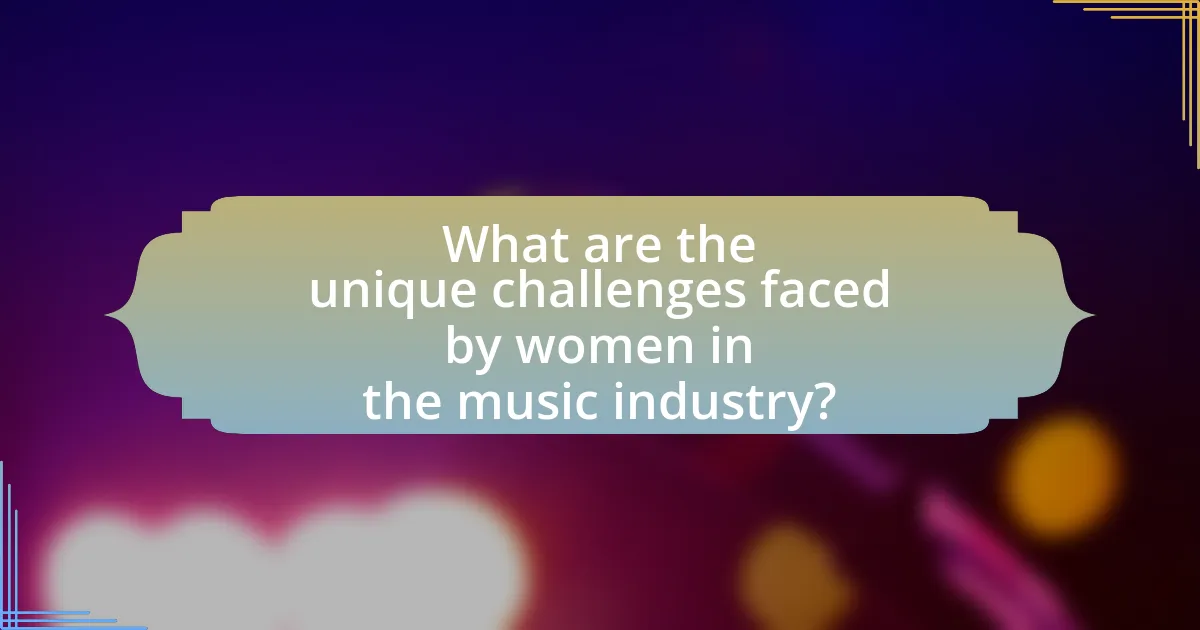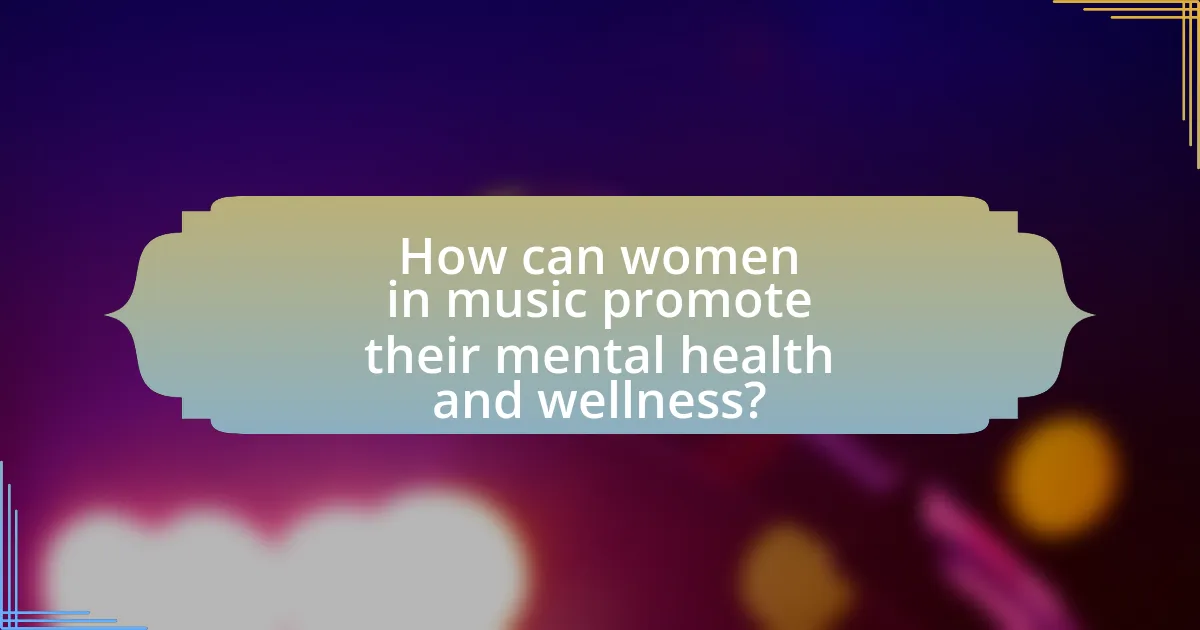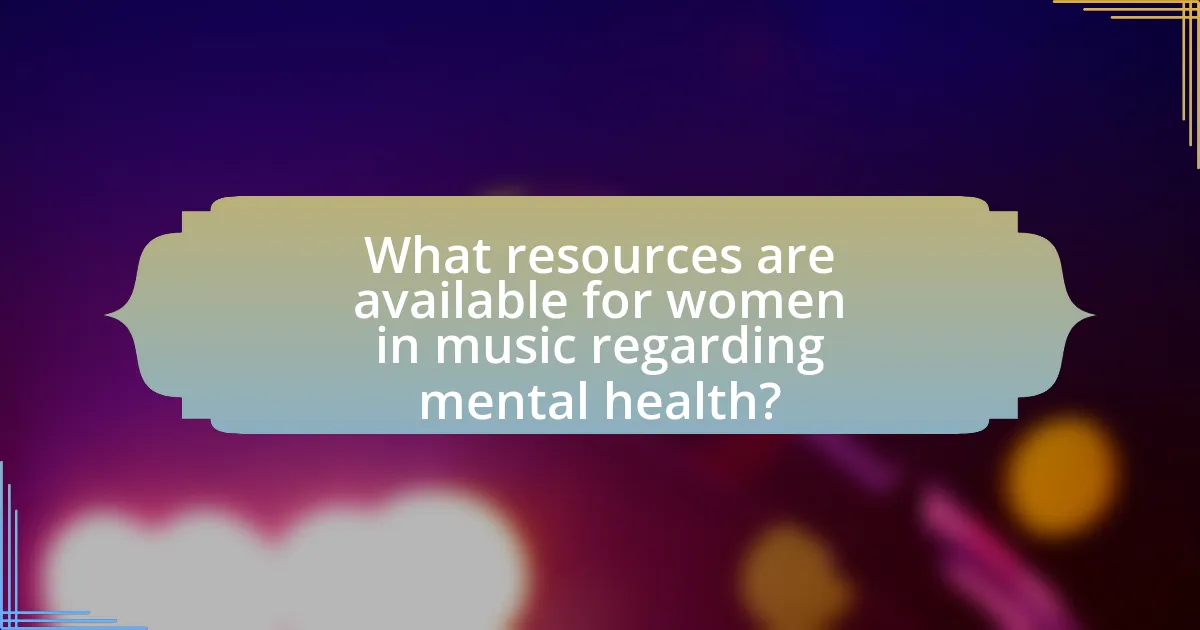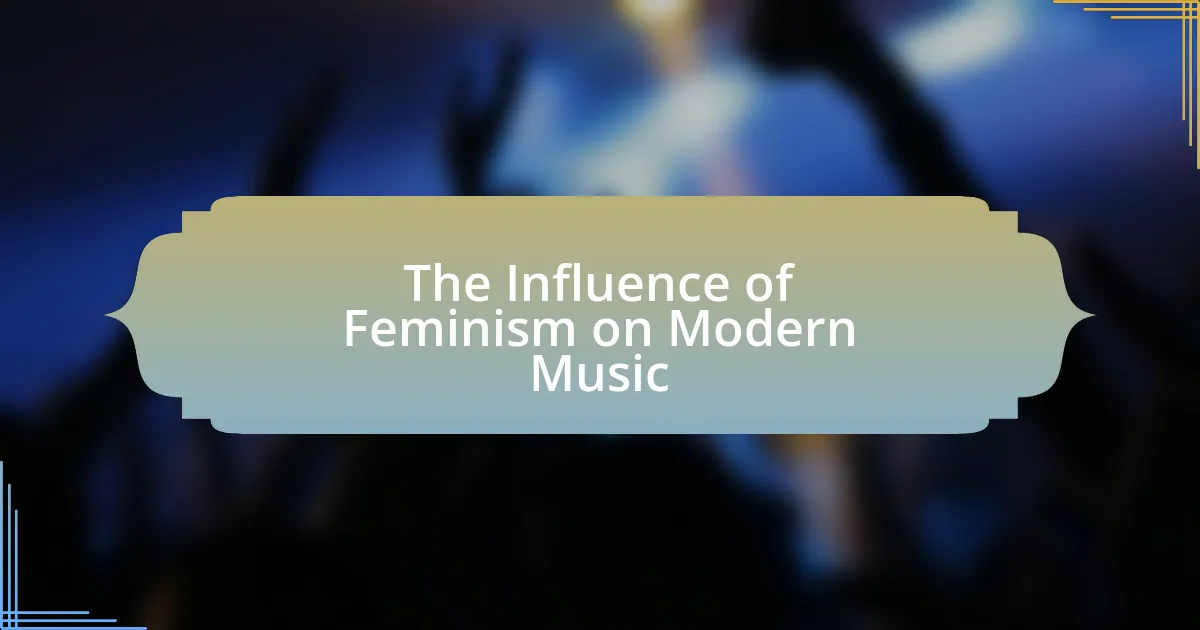The article “Women in Music: Navigating Mental Health and Wellness” examines the unique challenges faced by women in the music industry, including gender discrimination, underrepresentation, and harassment, which adversely affect their mental health. It highlights how societal expectations and stereotypes contribute to anxiety, depression, and feelings of inadequacy among female musicians. The article also discusses the impact of gender inequality and the gender pay gap on mental wellness, as well as barriers to accessing mental health resources. Furthermore, it offers strategies for promoting mental health, such as self-care practices, community support, and the importance of networking and mentorship, while outlining available resources and programs designed to support women in music.

What are the unique challenges faced by women in the music industry?
Women in the music industry face unique challenges including gender discrimination, underrepresentation, and harassment. Gender discrimination manifests in unequal opportunities for women in roles such as producers, engineers, and executives, where they are significantly outnumbered; for instance, a 2021 report by the Annenberg Inclusion Initiative found that only 21.7% of artists in popular music were women. Underrepresentation in decision-making positions limits women’s influence over industry standards and practices. Additionally, harassment remains a pervasive issue, with many women reporting experiences of sexual harassment and a hostile work environment, which can adversely affect their mental health and career progression. These challenges contribute to a complex landscape that women must navigate to achieve success in the music industry.
How do societal expectations impact women’s mental health in music?
Societal expectations significantly impact women’s mental health in music by imposing unrealistic standards regarding appearance, behavior, and success. These pressures can lead to anxiety, depression, and low self-esteem among female musicians, as they often feel compelled to conform to narrow definitions of femininity and success in a male-dominated industry. Research indicates that women in music face heightened scrutiny and criticism, which can exacerbate mental health issues; for instance, a study published in the Journal of Music Therapy found that female artists reported higher levels of stress and emotional distress compared to their male counterparts. This environment of constant evaluation can hinder their creative expression and overall well-being, further illustrating the detrimental effects of societal expectations on their mental health.
What stereotypes do women musicians encounter?
Women musicians encounter stereotypes that question their musical abilities, often portraying them as less skilled than their male counterparts. These stereotypes include assumptions that women are primarily performers rather than songwriters or producers, leading to underrepresentation in creative roles. Additionally, women face societal expectations regarding their appearance and behavior, which can overshadow their musical talent. Research indicates that female musicians are often judged more harshly for their personal choices, such as family planning, compared to male musicians, which can impact their career progression. These stereotypes contribute to a challenging environment for women in the music industry, affecting their mental health and overall wellness.
How do these stereotypes affect their mental wellness?
Stereotypes significantly impact the mental wellness of women in music by perpetuating feelings of inadequacy and limiting their self-expression. These stereotypes often portray women as less competent or overly emotional, leading to increased anxiety, depression, and self-doubt among female musicians. Research indicates that women in male-dominated fields, such as music, experience higher levels of stress and mental health issues due to societal pressures and discrimination. For instance, a study published in the Journal of Music Therapy found that female musicians reported feeling marginalized and faced barriers that negatively affected their mental health, highlighting the detrimental effects of these stereotypes on their overall well-being.
What role does gender inequality play in mental health issues?
Gender inequality significantly contributes to mental health issues, particularly among women. Research indicates that women facing gender-based discrimination experience higher rates of anxiety, depression, and stress-related disorders. For instance, a study published in the Journal of Affective Disorders found that women who encounter workplace inequality report a 30% increase in depressive symptoms compared to their male counterparts. Additionally, societal pressures and expectations placed on women can exacerbate feelings of inadequacy and low self-esteem, further impacting mental health. The intersection of gender inequality and mental health highlights the need for targeted interventions to address these disparities effectively.
How does the gender pay gap influence women’s mental health?
The gender pay gap negatively influences women’s mental health by contributing to increased stress, anxiety, and feelings of inadequacy. Research indicates that women who earn less than their male counterparts often experience lower self-esteem and higher rates of depression. A study published in the Journal of Health and Social Behavior found that women facing wage disparities reported significantly higher levels of psychological distress compared to those in equitable pay situations. This correlation highlights how financial inequity can exacerbate mental health challenges among women, particularly in high-pressure industries like music, where competition and visibility are critical.
What barriers do women face in accessing mental health resources?
Women face several barriers in accessing mental health resources, including stigma, financial constraints, and lack of tailored services. Stigma surrounding mental health often leads to feelings of shame and reluctance to seek help, which is particularly pronounced in the music industry where public perception can be critical. Financial constraints are significant, as many women may lack insurance or the means to afford therapy, especially in an industry known for its financial instability. Additionally, there is often a lack of mental health services specifically designed for women, which can make it difficult for them to find appropriate support that addresses their unique experiences and challenges. These barriers collectively hinder women’s ability to access the mental health resources they need.

How can women in music promote their mental health and wellness?
Women in music can promote their mental health and wellness by engaging in self-care practices, seeking professional support, and fostering supportive networks. Self-care practices such as regular exercise, mindfulness, and adequate rest have been shown to reduce stress and improve overall well-being. Research indicates that musicians often face high levels of anxiety and depression; therefore, seeking professional support from therapists or counselors can provide essential coping strategies. Additionally, building supportive networks with fellow musicians can create a sense of community, which is crucial for emotional resilience. Studies have demonstrated that social support significantly contributes to mental health, highlighting the importance of connection in the music industry.
What strategies can women musicians use to manage stress?
Women musicians can manage stress through various strategies, including mindfulness practices, physical exercise, and establishing a supportive network. Mindfulness techniques, such as meditation and deep-breathing exercises, have been shown to reduce anxiety and improve emotional regulation, which is crucial for musicians facing performance pressures. Regular physical exercise, supported by studies indicating its positive effects on mental health, can enhance mood and reduce stress levels. Additionally, building a supportive network of peers and mentors can provide emotional support and practical advice, which is essential for coping with the unique challenges women face in the music industry.
How can mindfulness practices benefit women in music?
Mindfulness practices can significantly benefit women in music by enhancing their mental well-being and performance. These practices, such as meditation and focused breathing, help reduce stress and anxiety, which are prevalent in the high-pressure environment of the music industry. Research indicates that mindfulness can improve emotional regulation and increase resilience, allowing women musicians to better cope with challenges and setbacks. For instance, a study published in the Journal of Music Therapy found that mindfulness interventions led to decreased anxiety and improved overall mental health among musicians. This evidence supports the notion that integrating mindfulness into daily routines can foster a healthier, more balanced approach to both personal and professional aspects of life in music.
What role does physical health play in mental wellness for musicians?
Physical health significantly influences mental wellness for musicians by enhancing their overall well-being and performance capabilities. Research indicates that regular physical activity can reduce symptoms of anxiety and depression, which are prevalent in the music industry. For instance, a study published in the Journal of Music Therapy found that musicians who engaged in consistent exercise reported lower levels of stress and improved mood. Additionally, maintaining physical health through proper nutrition and sleep can lead to better cognitive function and emotional regulation, essential for the demanding nature of musical performance. Thus, the interplay between physical health and mental wellness is crucial for musicians, as it directly impacts their ability to cope with the pressures of their profession.
How can community support enhance mental health for women in music?
Community support can significantly enhance mental health for women in music by providing a sense of belonging and reducing feelings of isolation. This support network fosters emotional resilience, as women in the industry often face unique challenges such as gender discrimination and mental health stigma. Research indicates that social connections can lead to lower levels of anxiety and depression, with a study published in the Journal of Music Therapy showing that group support activities can improve emotional well-being among musicians. By creating safe spaces for sharing experiences and resources, community support empowers women to navigate their mental health challenges more effectively.
What are the benefits of networking and mentorship?
Networking and mentorship provide significant advantages for individuals in the music industry, particularly for women. These benefits include access to valuable industry connections, which can lead to collaboration opportunities, job placements, and increased visibility. Mentorship specifically offers guidance from experienced professionals, helping mentees navigate challenges and develop skills essential for career advancement. Research indicates that 70% of mentored individuals report improved career outcomes, highlighting the effectiveness of mentorship in professional growth. Additionally, networking fosters a sense of community and support, which is crucial for mental health and wellness in a competitive field like music.
How can women musicians create supportive environments?
Women musicians can create supportive environments by fostering collaboration and mentorship among peers. By actively engaging in networking opportunities, they can share resources, experiences, and advice, which enhances community building. Research indicates that women in music often face unique challenges, and creating safe spaces for discussion can lead to improved mental health outcomes. For instance, initiatives like the Women’s Audio Mission provide training and support, demonstrating the effectiveness of structured programs in empowering women musicians.

What resources are available for women in music regarding mental health?
Women in music have access to various resources for mental health support, including organizations like MusiCares, which provides financial assistance and mental health services specifically for musicians. Additionally, the organization Women in Music offers networking opportunities and mental health resources tailored to women in the industry. Research indicates that mental health issues are prevalent in the music industry, with a study published in the Journal of Music Therapy highlighting the importance of support systems for artists. These resources aim to address the unique challenges women face in the music field, promoting mental wellness and resilience.
What organizations focus on mental health support for women musicians?
Organizations that focus on mental health support for women musicians include the Music Industry Mental Health Coalition, which aims to raise awareness and provide resources for mental health issues in the music industry, and She Rocks Awards, which highlights women in music and offers support networks. Additionally, the nonprofit organization Girls Rock Camp provides mentorship and resources for young female musicians, promoting mental well-being through music education. These organizations are dedicated to addressing the unique mental health challenges faced by women in the music industry, providing essential support and resources.
How do these organizations provide assistance?
Organizations provide assistance by offering mental health resources, support networks, and educational programs tailored for women in the music industry. For instance, initiatives like Women in Music provide access to counseling services, workshops on mental health awareness, and peer support groups, which are essential for addressing the unique challenges faced by women in this field. Research indicates that such targeted support can significantly improve mental well-being, as evidenced by a study published in the Journal of Music Therapy, which found that structured support systems enhance coping strategies among musicians.
What programs are specifically designed for mental wellness in music?
Programs specifically designed for mental wellness in music include the “Music and Mental Health” initiative by the Royal College of Music, which focuses on using music as a therapeutic tool to improve mental health outcomes. Another example is the “Music Therapy” program offered by the American Music Therapy Association, which employs music interventions to address emotional, cognitive, and social needs. Research indicates that music therapy can significantly reduce symptoms of anxiety and depression, supporting its effectiveness in promoting mental wellness.
What practical tips can women in music implement for better mental health?
Women in music can implement several practical tips for better mental health, including establishing a consistent self-care routine, seeking professional support, and fostering a supportive community. A consistent self-care routine, which may include regular exercise, mindfulness practices, and adequate sleep, has been shown to reduce stress and improve overall well-being. Seeking professional support, such as therapy or counseling, can provide women with coping strategies and a safe space to discuss their challenges. Additionally, fostering a supportive community through networking and collaboration can help combat feelings of isolation, as studies indicate that social support is crucial for mental health.
How can women musicians establish a healthy work-life balance?
Women musicians can establish a healthy work-life balance by setting clear boundaries between their professional and personal lives. This involves scheduling dedicated time for music-related activities while also prioritizing personal time for family, self-care, and relaxation. Research indicates that musicians who implement structured routines experience reduced stress and improved mental health. For instance, a study published in the Journal of Music Therapy found that musicians who practiced mindfulness and time management techniques reported higher levels of life satisfaction and lower anxiety. By actively managing their time and responsibilities, women musicians can achieve a more balanced and fulfilling lifestyle.
What self-care practices are most effective for women in the industry?
Effective self-care practices for women in the music industry include mindfulness meditation, regular physical exercise, and establishing strong social support networks. Mindfulness meditation has been shown to reduce stress and anxiety, which are prevalent in high-pressure environments like the music industry. A study published in the Journal of Music Therapy found that mindfulness practices can enhance emotional regulation and overall well-being among musicians. Regular physical exercise, such as yoga or aerobic activities, not only improves physical health but also boosts mental health by releasing endorphins, which can alleviate feelings of depression and anxiety. Additionally, having a strong social support network is crucial; research indicates that social connections can significantly improve resilience and coping strategies in stressful situations, making it easier for women in the industry to navigate challenges.





